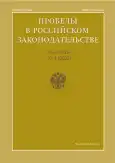От концепции проекта Устава Полицейского Российской Империи к его структуре и содержанию: взгляды членов комиссии сенатора А. А. Макарова (1906–1917 гг.). 12. Особые обязанности полиции Российской империи по Проекту Устава Полицейского, разрабатываемого комиссией сенатора А. А. Макарова
- Авторы: Шурухнов Н.Г.1,2
-
Учреждения:
- Федеральное казенное учреждение «Научно-исследовательский институт Федеральной службы исполнения наказаний»
- Тульский институт (филиал) федерального государственного бюджетного образовательного учреждения высшего образования «Всероссийский государственный университет юстиции (РПА Минюста России)»
- Выпуск: Том 18, № 1 (2025)
- Страницы: 38-45
- Раздел: Теоретико-исторические правовые науки
- URL: https://journal-vniispk.ru/2072-3164/article/view/288806
- EDN: https://elibrary.ru/GIYSFP
- ID: 288806
Цитировать
Аннотация
Рассматриваются так называемые особые обязанности полиции Российской империи, сосредоточенные в главе десятой Проекта Устава Полицейского, готовившегося комиссией сенатора А. А. Макарова в период с 1906 по 1917 г. Они охватывают очень широкий круг полномочий, определенное их количество не связано с непосредственными функциями Министерства внутренних дел. Автор, в первую очередь, представляет те обязанности полицейских чинов, которые направлены на: нормализацию общественного порядка; содействие спокойствию населения; сохранение жизни и здоровья граждан; охрану личного имущества владельцев; исполнение правовых актов государства и его органов; эффективность деятельности судебных установлений; обеспечение воинской повинности. Другие задачи полиции автор попытался объединить в пять условных групп: 1) обеспечивающие исполнение повинностей; 2) направленные на удостоверение прав граждан; 3) способствующие организации выполнения специфических работ; 4) исполняющие паспортные правила; 5) относящиеся к таможенной деятельности. В заключение дал классификацию обязанностей, не только сосредоточенных в 10 главе, но и во всем Проекте Устава Полицейского.
Ключевые слова
Полный текст
Открыть статью на сайте журналаОб авторах
Николай Григорьевич Шурухнов
Федеральное казенное учреждение «Научно-исследовательский институт Федеральной службы исполнения наказаний»; Тульский институт (филиал) федерального государственного бюджетного образовательного учреждения высшего образования «Всероссийский государственный университет юстиции (РПА Минюста России)»
Автор, ответственный за переписку.
Email: matros49@mail.ru
ORCID iD: 0000-0003-1132-760X
SPIN-код: 4706-0211
д-р юрид. наук, профессор, ведущий научный сотрудник, профессор кафедры уголовного права и процесса
Россия, Москва; ТулаСписок литературы
- Проектъ Устава Полицейскаго съ постатейными объясненiями. 4-е Приложенiе к законопроекту о преобразованiи полицiи въ Империи. — С.- Петербург, Типографiя Министерства Внутреннихъ Делъ, 1913. — 268 с.
- Казанина Л. Ю., Шурухнов Н. Г. Обязанности, не свойственные деятельности полиции Российской империи: попытка их минимизации по проекту межведомственной Комиссии «По преобразованiю полицiи въ имперiи» (1906–1911) // Актуальные проблемы борьбы с преступлениями и иными правонарушениями в Российской Федерации: материалы Всерос. науч.-практ. конф. (Тула, 27 января 2023 года). Тула: Тульский институт (филиал) ВГУЮ (РПА Минюста России), 2023. — С. 115–127.
- Свод общих губернских учреждений // Свод законов Российской империи. — СПб.: Тип. 2-го Отд-ния Собств. Е.И.В. канцелярии, 1857–1868. — Т. 2, ч. 1. — 1857. — С. 1–209.
- Устав уголовного судопроизводства. 20 ноября 1864 г. // КонсультантПлюс: официальный сайт. — URL: http://www.consultant.ru (дата обращения: 14.07.2024).
- Судебные уставы Российской империи (в сфере гражданской юриспруденции). Устав гражданского судопроизводства. — М., 2018. — С. 56–216 // КонсультантПлюс: официальный сайт. — URL: http://www.consultant.ru (дата обращения: 14.07.2024).
- Уставъ судопроизводства торговаго. Изданiе 1903 г. // Сводъ Законовъ Россiйской Имперiи. Томъ ХI. Часть вторая. — С. 1118–1162.
- Учрежденiе судебныхъ установленiй. Издание 1892 г. Книга первая. Общее учрежденiе судебныхъ установленiй // Сводъ Законовъ Россiйской Имперiи. Том шестнадцатый. Часть первая. — С. 1–112.
- Устав гражданского судопроизводства. Учрежденiе судебныхъ установленiй. Издание 1892 г. Книга первая. Общее учрежденiе судебныхъ установленiй. // Сводъ Законовъ Россiйской Имперiи. Том шестнадцатый. Часть первая. — С. 113–324.
- Сводъ Законовъ Гражданскихъ. Изданiе 1900 года // Сводъ Законовъ Россiйской Имперiи. Томъ X. Часть 1-я. — С. 1–208.
- Свод общих губернских учреждений // Свод законов Российской империи. — СПб.: Тип. 2-го Отд-ния Собств. Е.И.В. канцелярии, 1857–1868. — Т. 2, ч. 1. — 1857. — С. 1–209.
- Сводъ Учрежденiй и Уставовъ о Содержащiхся подъ Стражею. Изданiе 1890 года // Сводъ Законовъ Россiйской Имперiи. Томъ ХIV. — C. 148–227.
- Уставъ о ссыльныхъ. Изданiе 1909 года // Сводъ Законовъ Россiйской Имперiи. Томъ ХI. — С. 228–262.
- Общiй горный уставъ // Сводъ Законовъ Россiйской Имперiи. Томъ VI I. Книга первая. — С. 7–184.
- Положенiе о воспитательно-исправительныхъ заведенiяхъ для несовершеннолѣтнихъ. Издание 1909 года // Сводъ Законовъ Россiйской Имперiи. Томъ XIV. — С. 263–267.
- Об условном досрочном освобождении. Высочайше утвержденный одобренный Государственным советом и Государственной думой закон 22 июня 1909 // КонсультантПлюс: официальный сайт. — URL: http://www.consultant.ru (дата обращения: 14.07.2024).
- Уставъ военно-судебный // Сводъ военныхъ постановленiй. Изданiе 1869 года. Книга двадцать четвертая. САНКПЕТЕРБУРГ, 1869.
- Военно-морской судебный устав 1887 // Собрание узаконений и распоряжений правительства. Издаваемое при правительствующем сенатъ. Кн.18. — 326 с.
- Уставъ о воинской повинности. Изданiе 1897 года // Сводъ Уставовъ о Повинностяхъ. Книга первая // Сводъ Законовъ Россiйской Имперiи. Томъ IV. — С. 1–128.
- Уставъ о Земскихъ Повинностяхъ. Изданiе 1899 года // Сводъ Уставовъ о Повинностяхъ. Книга вторая. // Сводъ Законовъ Россiйской Имперiи. Томъ IV. — С. 9–367.
- Уставъ о паспортахъ. Издание 1903 г. // Сводъ законовъ Российской империи. Том четырнадцатый. — С. 1–64.
- Сводъ законовъ о состоянiях. Изданiе 1899 г. // Сводъ законовъ Российской империи. Том IX. — C. 1–208.
- Уставъ таможенный. Издание 1910 года // Сводъ законовъ Российской империи. Том VI. — C. 1–141.
- Шурухнов Н. Г., Лобачева Л. П. Основные направления реформирования полиции Российской империи: краткое реферирование предложений Комиссии А. А. Макарова // Пробелы в российском законодательстве. Том / Vol. 16. — 2023. — № 3. — С. 13–21.
Дополнительные файлы








